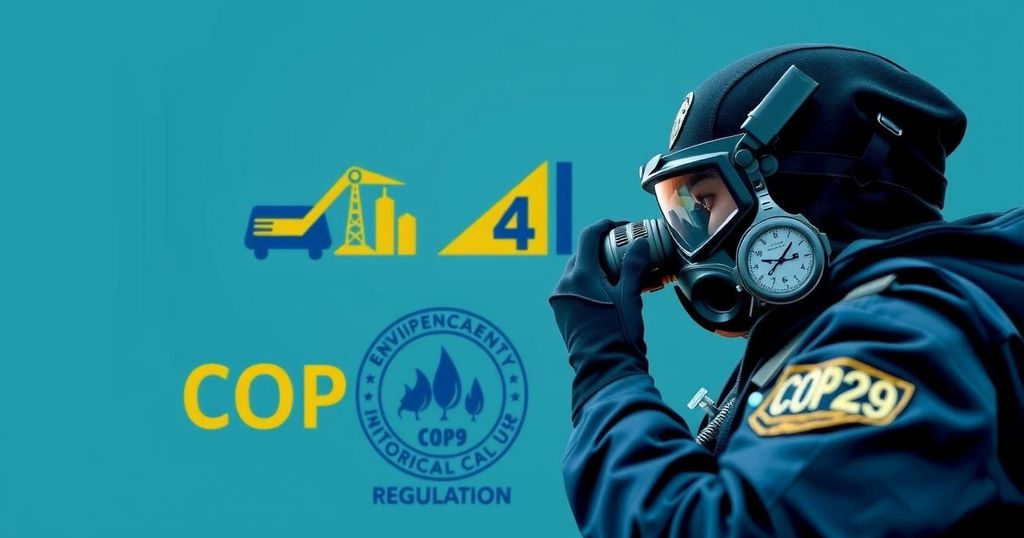The article emphasizes the importance of COP29 in enforcing the “polluter pays” principle to hold corporations and countries accountable for their greenhouse gas emissions. It outlines the need for robust legislative measures, including taxing polluters, ending fossil fuel subsidies, and establishing legal accountability for climate damage. The success of COP29 relies on global commitment to equity and transparency in climate action, particularly concerning vulnerable regions disproportionately affected by climate change.
The 29th Conference of the Parties (COP29), scheduled to take place in Azerbaijan in November 2024, represents a critical opportunity to implement the principle that polluters must bear the costs associated with their emissions. This principle, which emphasizes corporate and national accountability for greenhouse gas emissions, has been a focal point in climate discussions for years yet remains under-enforced in practice. Past conferences, such as COP17 in Durban, South Africa, laid down plans for global emission reductions. Despite these ambitions, tangible outcomes have often been lacking. For instance, nations have made only voluntary pledges to reduce emissions under the Paris Agreement, resulting in widespread failure to meet these commitments without sanctions. The urgent need for action is underscored by the alarming pace of climate change, with the world experiencing a global temperature rise of over 2°C above pre-industrial levels as of November 2023. The potential economic and health repercussions of inaction are severe, particularly for vulnerable regions like Africa, which may face billions of dollars in annual costs and significant loss of life due to climate-related impacts. As a Professor of Environmental Science at the University of South Africa, I propose that COP29 can robustly address this crisis by adopting measures such as taxation of polluters, imposing legal liability for past emissions, and establishing mandatory finance liability frameworks for corporations. Ending fossil fuel subsidies is essential, given the significant contribution of major fossil fuel companies to global emissions and the alarming growth of subsidies in recent years. Furthermore, a global fund should be created where major polluters contribute to support adaptation and mitigation efforts in affected regions. Moreover, implementing stringent carbon pricing and taxation mechanisms will compel polluters to internalize the environmental costs of their actions, motivating a shift towards cleaner technologies. In contrast, the current cap-and-trade systems have demonstrated significant shortcomings, often exacerbating environmental injustices. Legal accountability through international courts could provide a platform for compensating victims of climate-related harm, reinforcing the necessity for corporate accountability, particularly concerning historical emissions. To advance these objectives, COP29 must also mandate stricter financial disclosure laws for corporations to enhance transparency regarding their environmental impact, making it easier to hold them accountable for their contributions to climate change. The idea of establishing a formal global climate reparations fund is crucial for addressing the legacy of unregulated fossil fuel emission practices. The outcome of COP29 hinges on the willingness of governments and corporations to embrace justice, equity, and transparency to distribute the responsibility of combating climate change fairly. This approach is essential to ensure that nations and communities least responsible for emissions are not disproportionately burdened with the consequences of climate inaction.
The article discusses the upcoming COP29 conference, which is expected to address the longstanding issue of holding polluters accountable for their greenhouse gas emissions. It highlights the importance of implementing the “polluter pays” principle, which mandates that those responsible for pollution should bear the costs associated with their environmental impact. This principle, although widely recognized, has not been adequately enforced, particularly as many major polluters continue to operate without financial consequences for their emissions. Historical context references earlier COPs, particularly COP17 in Durban, which set ambitious climate goals but lacked the necessary enforcement mechanisms to ensure compliance. The impending COP29 represents a crucial moment for establishing legally binding measures to hold corporations and countries accountable, promoting climate justice, and mitigating the impacts of climate change, especially in vulnerable regions like Africa.
In conclusion, COP29 must seize the opportunity to enforce accountability for greenhouse gas emissions through rigorous legislative and financial frameworks that compel polluters to contribute to climate adaptation and mitigation efforts. The potential measures, including the taxation of emissions, the establishment of liability structures for past pollution, and the creation of transparency regulations, are essential components in the fight against climate change. The success of COP29 is contingent upon a collective commitment from the international community to uphold justice and equity in addressing environmental challenges. Only through effective implementation of the “polluter pays” principle can meaningful progress be achieved in limiting global warming and protecting vulnerable populations from its devastating impacts.
Original Source: nation.africa






